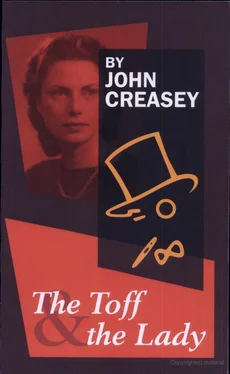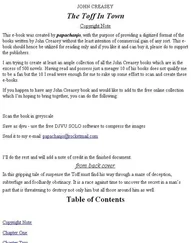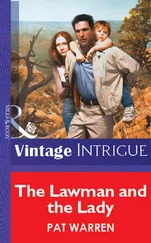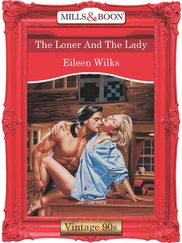John Creasey - The Toff and The Lady
Здесь есть возможность читать онлайн «John Creasey - The Toff and The Lady» весь текст электронной книги совершенно бесплатно (целиком полную версию без сокращений). В некоторых случаях можно слушать аудио, скачать через торрент в формате fb2 и присутствует краткое содержание. Жанр: Старинная литература, на русском языке. Описание произведения, (предисловие) а так же отзывы посетителей доступны на портале библиотеки ЛибКат.
- Название:The Toff and The Lady
- Автор:
- Жанр:
- Год:неизвестен
- ISBN:нет данных
- Рейтинг книги:5 / 5. Голосов: 1
-
Избранное:Добавить в избранное
- Отзывы:
-
Ваша оценка:
- 100
- 1
- 2
- 3
- 4
- 5
The Toff and The Lady: краткое содержание, описание и аннотация
Предлагаем к чтению аннотацию, описание, краткое содержание или предисловие (зависит от того, что написал сам автор книги «The Toff and The Lady»). Если вы не нашли необходимую информацию о книге — напишите в комментариях, мы постараемся отыскать её.
The Toff and The Lady — читать онлайн бесплатно полную книгу (весь текст) целиком
Ниже представлен текст книги, разбитый по страницам. Система сохранения места последней прочитанной страницы, позволяет с удобством читать онлайн бесплатно книгу «The Toff and The Lady», без необходимости каждый раз заново искать на чём Вы остановились. Поставьте закладку, и сможете в любой момент перейти на страницу, на которой закончили чтение.
Интервал:
Закладка:
Cray stepped swiftly to the bed on which Hilda lay.
It was a magnificent room, magnificently furnished, but Rollison had eyes only for Hilda, who was on her back, her face a bluish grey, her eyes closed and her body motionless.
Rollison muttered:
“It’s probably adrenalin, injected. I know she’s had one dose.”
Cray opened his bag, took out his wallet and scribbled a few words on a card. He handed it to the policeman who had climbed the ladder, and said:
“Get this made up at the nearest chemist, and tell them it is urgent.”
“Right, sir.” The man hurried out, and Cray began to examine Hilda, who did not stir. Rollison sat on the arm of a chair, staring at the bed; the Inspector stood on the far side. A few moments later, Gwendoline came in. She stifled a scream, moved slowly to Rollison’s side, and stood watching. Renfrew did not appear.
Only then was Rollison again aware of pain in his right hand. Looking down, he saw that there was a cut, still bleeding slightly, on the fleshy part of the wrist.
There was a big bump at the back of Rollison’s head, which was tender when he touched it and which prevented him from wearing a hat; apart from that, and a piece of lint and sticking plaster on his hand, he did not feel much ill-effect from his fall. He sat back in the easy chair by his desk, with Jolly pouring out tea, and the Lady of Lost Memory staring at him anxiously.
It was twenty-four hours since his fall. In the interim, he had been in no state to talk or think, and his head still ached.
When he had left Barrington House, Dr. Cray had said that there was a fair chance of Hilda recovering. She had been moved to hospital, and Rollison was reasonably certain that she would be in no further danger. The footman, Farrow, had disappeared from Barrington House. Gwendoline and Renfrew had told their story to the police, who had been non-committal, but Rollison knew that a search was already being made for Farrow.
He had not yet heard Jolly’s story, nor heard from Grice. The friendly cabby had brought him to the flat. Policemen remained at Barrington House with Gwendoline and Renfrew.
“Are you sure that you won’t have a tot of whisky or brandy in the tea sir?” asked Jolly.
“No thanks,” said Rollison. I’m all right.”
“All right!” exclaimed the Lady of Lost Memory. “You look on the point of death!”
She was wearing a tweed suit, which Jolly had obtained from a theatrical costumier’s, was bare-headed and very lovely. It was not imagination that her eyes were filled with alarm. Rollison looked at her, and sipped his tea before he spoke.
“I’m not quite as bad as that. You lock delightful, and much better.”
“Oh, please!” she said. “Mr. Rollison, what happened? Was it to do with me?”
“Only indirectly,” said Rollison. “It’s a long and complicated story, and I don’t feel up to telling it just now.”
“I think you should go back to bed,” she declared.
“I think I will turn in for an hour or two. You won’t go out again, will you?”
“Not if you wish me to stay here.”
“I do.” Rollison stood up cautiously, went towards the doer, and then turned towards her. “One small thing—Mrs. Barrington-Ley is ill, I wonder if you would care to write a note of regret?”
“Of course,” she said. “Is she seriously ill?”
“I think she will soon be all right,” said Rollison. “Jolly will take the letter round.” He nodded and smiled, looking very woebegone, and then entered the bedroom. Jolly closed the door, and regarded Rollison with mild surprise.
“I don’t want her to go out again and I can’t shut her up in her own room,” said Rollison, “so field headquarters are moved into here. What happened at the nursing home?”
“I saw Miss Armitage through the window, sir, but she was most adamant in her refusal to speak to me, and consequently there was nothing I could do. The police were there very soon after me. Had the young woman been amenable I might have obtained useful information.”
“She was right enough,” said Rollison. “I like to think that she’s usually right. I hope Grice will soon turn up with the full story. You know what happened, I suppose?”
“I understand that the matron was murdered, sir.”
“Who told you that?”
“I waited until the Superintendent was there, and then managed to overhear a little of what was said,” said Jolly.
“I see. Well, plenty was doing at Barrington House. I got off lightly. Are you in a receptive mood?”
“I think so, sir.”
“Good! Then listen to me. Take Farrow the footman first,” said Rollison. “I have always thought him insolent, but I am not sure whether that’s the right word. He’s not a footman, and can’t hide it. He might be employed by Pomeroy. But on the other hand, someone sent me that photograph and so was sure of impending trouble; the same person might have employed Farrow to work and watch at the house.”
“You mean, perhaps, Mr. Barrington-Ley?” murmured Jolly.
“Yes.”
“Which would be a presumption of Mr. Barrington-Ley’s complete innocence.”
“I know,” said Rollison, “that’s what I want to presume. We’ll have to check on Farrow. Now, what of Dr. Renfrew?”
“I have made some further inquiries about him,” said Jolly. “He is in some financial difficulties. I do not know in what degree, but I hope to find out shortly.”
“If he’s desperately hard up, he might do odd things for money,” said Rollison. “Check that as soon as you can. And now . . .”
During the next quarter of an hour Rollison regaled Jolly with the salient points of the story, while he undressed, put on pyjamas and a dressing-gown and got into bed gratefully. Jolly arranged the pillows so that he had support for his neck without pressure on the tender spot of his cranium. Then he stood by the side of the bed.
“And so,” said Rollison, at last, “that’s the whole story. What do you make of it?”
“I am rather at a loss, sir, to understand your uncertainty about the footman,” said Jolly. “He certainly had every opportunity to inject the drug on two occasions—I assume that the second occasion was like the first, an injection of adrenalin?”
“It had the same effects, and Cray thinks so.”
“Then it is reasonably certain that it was administered by the same person, sir.”
“Yes. Adrenalin isn’t the easiest of drugs to obtain, you know.”
“No, sir, but unqualified persons have access to even more dangerous drugs than that—as you have often discovered.”
“The narcotics, yes. Adrenalin is a different matter. Why did Renfrew compromise his whole future by saying nothing about what he admits was an attempt at murder?”
“His explanation appears sufficient, sir,” said Jolly thoughtfully.
“Appears, yes. And it also would be a very good explanation if he actually gave the injection.” Rollison smiled at Jolly’s expression. “Suggestion not well received, Jolly?”
“Well, sir, with the utmost respect—would the man who first interested you in this matter and who arranged to send Madam here, take such a step?” asked Jolly.
“Meaning that the bump on my head is affecting my logic,” said Rollison. “Many things which Renfrew has done seem unlikely. Why did he get a friend to take her to his home—I mean our guest—and then send her here in a taxi? And why did he keep her away from here for several hours?”
“Is it so remarkable, sir?”
“At the moment, I think so,” said Rollison. “Renfrew was in a great hurry to get away after talking to me, but he returned remarkably quickly. The last thing I saw when I was hanging from the window was Renfrew coming into the room. Then someone stabbed me in the hand, with the unkind intention of making me break my neck.” When Jolly did not answer, Rollison went on: “The doubts about the villainy of Farrow the footman come in there. He wasn’t in that room. He had, apparently, fled the house before then. Renfrew was there with Miss Gwendoline, the butler, another footman, and the maid. Any one of them could have come to the window and used the knife, but it could not have been the footman.”
Читать дальшеИнтервал:
Закладка:
Похожие книги на «The Toff and The Lady»
Представляем Вашему вниманию похожие книги на «The Toff and The Lady» списком для выбора. Мы отобрали схожую по названию и смыслу литературу в надежде предоставить читателям больше вариантов отыскать новые, интересные, ещё непрочитанные произведения.
Обсуждение, отзывы о книге «The Toff and The Lady» и просто собственные мнения читателей. Оставьте ваши комментарии, напишите, что Вы думаете о произведении, его смысле или главных героях. Укажите что конкретно понравилось, а что нет, и почему Вы так считаете.












